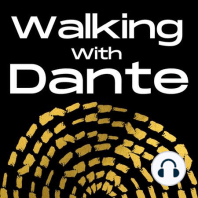26 min listen

How To Be Human And How To Quit Being Human: Inferno, Canto X, Lines 73 - 93
How To Be Human And How To Quit Being Human: Inferno, Canto X, Lines 73 - 93
ratings:
Length:
31 minutes
Released:
Mar 24, 2021
Format:
Podcast episode
Description
After the episode with Cavalcante among the heretics, a passage about human pain, loss, and suffering, we return to Farinata, our Greco-Roman statue--who becomes less so over the course of the strange, twisty passage in INFERNO.
Join me, Mark Scarbrough, as we explore the roots of Dante's art: What does it mean to be human? Who loses their humanity in this passage? Not Farinata, strangely enough. Certainly not Cavalcante in the last passage. And not our poet. Instead, our pilgrim may be the one who still cannot overcome the cycles of shame and vendetta, who then loses his humanity at a moment when human loss seems most pressing.
Here are the segments of this episode:
[01:29] My English translation of the passage from INFERNO: Canto X, lines 73 - 93. If you'd like to see this passage or start a discussion about it, find it on the website walkingwithdante.com.
[03:43] A bit of a descent into the linguistic weeds, all about the term "magnanimo," used to describe Farinata and possibly a more difficult adjective that we might first imagine. How is Farinata "austere" (as I translated it) or "magnificent" or "powerful"? Maybe not as much as we think.
[10:46] Heretic or hero? And while we're at it, can politics and art even talk to each other? Or do they always talk past each other? Can in fact they even hear each other?
[15:10] We discover that we are in a landscape of exiles: Virgil, Farinata, Cavalcante, his son, and even our pilgrim, Dante (and certainly the poet behind him).
[23:13] The full scope of Farinata's humanity. No, he will never become a humanist poet. But he does soften. There may be historical reasons for that. And there may be structural reasons from the poem itself for that.
[27:14] How do you lose you humanity? And who is losing it in this passage? The answer is more shocking than at first blush.
Join me, Mark Scarbrough, as we explore the roots of Dante's art: What does it mean to be human? Who loses their humanity in this passage? Not Farinata, strangely enough. Certainly not Cavalcante in the last passage. And not our poet. Instead, our pilgrim may be the one who still cannot overcome the cycles of shame and vendetta, who then loses his humanity at a moment when human loss seems most pressing.
Here are the segments of this episode:
[01:29] My English translation of the passage from INFERNO: Canto X, lines 73 - 93. If you'd like to see this passage or start a discussion about it, find it on the website walkingwithdante.com.
[03:43] A bit of a descent into the linguistic weeds, all about the term "magnanimo," used to describe Farinata and possibly a more difficult adjective that we might first imagine. How is Farinata "austere" (as I translated it) or "magnificent" or "powerful"? Maybe not as much as we think.
[10:46] Heretic or hero? And while we're at it, can politics and art even talk to each other? Or do they always talk past each other? Can in fact they even hear each other?
[15:10] We discover that we are in a landscape of exiles: Virgil, Farinata, Cavalcante, his son, and even our pilgrim, Dante (and certainly the poet behind him).
[23:13] The full scope of Farinata's humanity. No, he will never become a humanist poet. But he does soften. There may be historical reasons for that. And there may be structural reasons from the poem itself for that.
[27:14] How do you lose you humanity? And who is losing it in this passage? The answer is more shocking than at first blush.
Released:
Mar 24, 2021
Format:
Podcast episode
Titles in the series (100)
Virgil And His Misunderstanding Of The Harrowing Of Hell: Inferno, Canto IV, Lines 46 - 84 by Walking With Dante